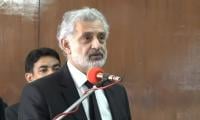ISLAMABAD: High profile appointment of four members of the Election Commission of Pakistan (ECP) after the retirement of the incumbents in five weeks will generate another major political controversy anytime.
These nominations are regarded as highly important as the new members will be in office to supervise the next general elections in 2018. As luck would have it, the then Prime Minister (Raja Pervez Ashraf) of the Pakistan People’s Party (PPP) and the then leader of opposition (Chaudhary Nisar Ali Khan) belonging to the Pakistan Muslim League-Nawaz (PML-N) had chosen the ECP members in 2011.
Now again, the top representatives of the two parties with reversal of their roles will select the new members. Only thick-skinned retired superior court judges or senior lawyers, one from every province, will accept the tough assignment in view of the previous unprecedented slandering and vilification done by the Pakistan Tehreek-e-Insaf (PTI), the four present members have to live with for almost half of their five-year term.
Under the Constitution, the leaders of the House and opposition in the National Assembly have the major role to play in these appointments as they only have to consult with each other. The role of any other parliamentary party will emerge only when the matter is referred to the parliamentary committee.
Among the present ECP members, Riaz Kiyani, representing Punjab, had attracted the unparalleled tirade from the PTI although his colleagues Roshan Essani from Sindh, Shahzad Akbar Khan from Khyber Pakhtunkhwa and Fazlur Rehman from Balochistan were also not spared. But they did not yield to the political pressure.
The process of consultations for key appointments will have to be started soon if the ECP is to be avoided from becoming incomplete due to their absence because the Constitution says the ECP consists of the Chief Election Commissioner (CEC) and four members.
For the purpose of election to both Houses of Parliament, provincial assemblies and for election to such other public offices as may be specified by law, a permanent ECP will be constituted in accordance with the Constitution.
Although the Constitution rules out interference of any political party in this process, which is confined to the premier and the opposition leader only, consultations with other political forces are not ruled out with the objective of averting eruption of any unnecessary row.
But the problem is that even if the PTI is taken on board, it has the habit of agitating against what it has already agreed if things do not go in accordance with its will. Same happened in the case of nomination of Fakhruddin G Ebrahim as the CEC.
The bipartisan parliamentary committee on electoral reforms has mulled over introducing a new criterion for the appointment of the CEC and ECP members, and plans to amend the Constitution accordingly. But unless this is done, the members will be named in accordance with the existing constitutional scheme.
Article 213 says the prime minister will in consultation with the leader of opposition forward names for appointment of four ECP members to a parliamentary committee (PC) for hearing and confirmation.
The PC to be constituted by the Speaker will comprise fifty percent members each from the treasury benches and the opposition parties, based on their strength in Parliament, to be nominated by the respective parliamentary leaders.
However, in case there is no consensus between the prime minister and the opposition leader, each will forward separate list to the PC for consideration for hearing and confirmation. The total strength of the PC will be twelve members out of which one-third will be from the Senate.
Like their predecessors, the new members will have constitutionally guaranteed five-year tenure and can’t be sent home except in the manner prescribed in article 209 for the removal from office of a superior court judge. They are provided a secure term so that they don’t remain on the edge or at the mercy of the government of the day.
The 18th amendment passed by the previous parliament had empowered the ECP members and reduced the authority of the CEC to some extent. As per this arrangement, the CEC and members take decisions in the ECP.
According to the CTD spokesman, the two were attempting to enter Punjab from Khyber Pakhtunkhwa
Foreign Office's silence on the US threat to impose sanctions on Pakistan for economic agreements with Iran
President Zardari express views while talking to the visiting Chairman of China International Development Cooperation...
Kundi emphasised that recent electoral outcomes indicated a public preference for parliamentary cooperation over...







